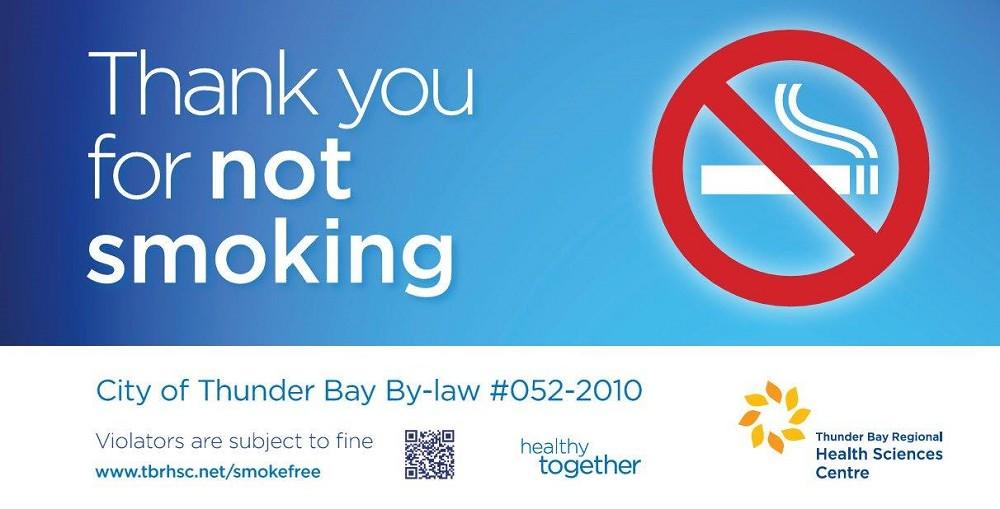National Non-Smoking Week Celebrates Smoke-Free Hospitals Across Ontario
by Sara Chow
 This year, Thunder Bay Regional Health Sciences Centre is celebrating National Non-Smoking Week, held from January 15-21, by reminding everybody that all hospital properties in Ontario are smoke-free under the Smoke-Free Ontario Act. The Hospital has had a 100% smoke-free property since 2013, putting the health of their patient’s first and favouring the 75% majority of the population who don’t smoke.
This year, Thunder Bay Regional Health Sciences Centre is celebrating National Non-Smoking Week, held from January 15-21, by reminding everybody that all hospital properties in Ontario are smoke-free under the Smoke-Free Ontario Act. The Hospital has had a 100% smoke-free property since 2013, putting the health of their patient’s first and favouring the 75% majority of the population who don’t smoke.Hospitals have an important role in public health protection. That’s why Ontario amended the Smoke-Free Ontario Act (SFOA) to include all hospital properties in their tobacco bans.
As of January 1, 2016, the SFOA legislates that smoking is banned on hospital properties across all of Ontario, subject to a few specific exceptions. While some hospitals in Ontario still have designated smoking areas, they must be removed by January 1, 2018, making all hospitals in Ontario 100% smoke-free. At Thunder Bay Regional Health Sciences Centre, e-cigarettes are also prohibited on the property.
“This change to provincial legislation is excellent news for our Hospital,” says Kelly-Jo Gillis, Manager of Preventive Health Services. “When we renewed our commitment to a smoke-free property in 2013 and had the municipal by-law amended to include our property, we didn’t know that this province-wide change was going to happen. We were really thinking ahead, and this change validates that we were doing the right thing for our patients, families, visitors and staff.”
Our Hospital’s primary reason for supporting a 100% smoke-free property is to put the health of our patients first. In early internal and community engagement sessions, both people who smoke and non-smokers agreed that the Hospital should have a smoke-free property to protect the health of everyone who access the facility and to role model healthy behaviour. Furthermore, while it is estimated that approximately 25% of people in Northwestern Ontario smoke, 75% of the population are non-smokers. Therefore, the smoke-free grounds also favours the majority of the population.
It is common knowledge that smoking can be a deadly addiction, with 50% of people who smoke dying from a smoking-related illness and 800 Canadians dying from lung cancer and heart disease caused by second-hand smoke. The second-hand smoke is a primary focus of smoking bans, because bans help to protect everyone from second-hand smoke exposure, which still contains the same chemicals that are inhaled when smoking. 70 of the 4,000 known chemicals in cigarettes cause cancer.
From a health care organization’s point of view, smoking bans can encourage and motivate patients to be smoke-free and keeps non-smoking patients (who may include children, expecting mothers, cancer patients and patients with respiratory conditions) safe from the harms of second-hand smoke. For patients who smoke and have been thinking about quitting, bans help to support and motivate this healthy behaviour change. When looking at the bigger picture, this means that hospital smoking bans can help to reinforce the importance of quitting smoking and leading a smoke-free lifestyle (especially for patients who may already have a smoking-related illness). In the short-term, this could help to enhance recovery, prevent some readmissions and in the long-term, contribute to a healthier community.
“Our hospital is working hard to support our patients who smoke to be smoke-free during their stay,” explains Gillis. “Patients are asked if they smoke, and if they have thought about quitting. They are encouraged to use nicotine replacement therapy that their nurse can provide, and have options for the Smokers’ Helpline to contact them or to see a nurse at bedside, who specializes in smoking cessation. We know that in order to have a smoke-free property then we need to be supportive and sensitive to our patients.”
National Non-Smoking Week is from January 15th to the 21st. For more information on the Hospital’s smoke-free grounds and quitting smoking, visit www.tbrhsc.net/smokefree or visit www.NWquit.com for more regional resources.